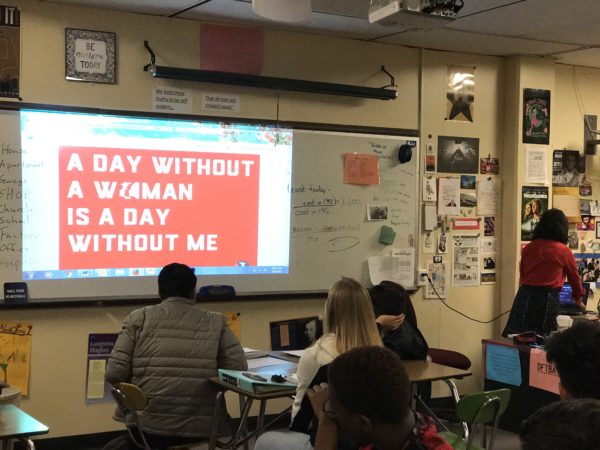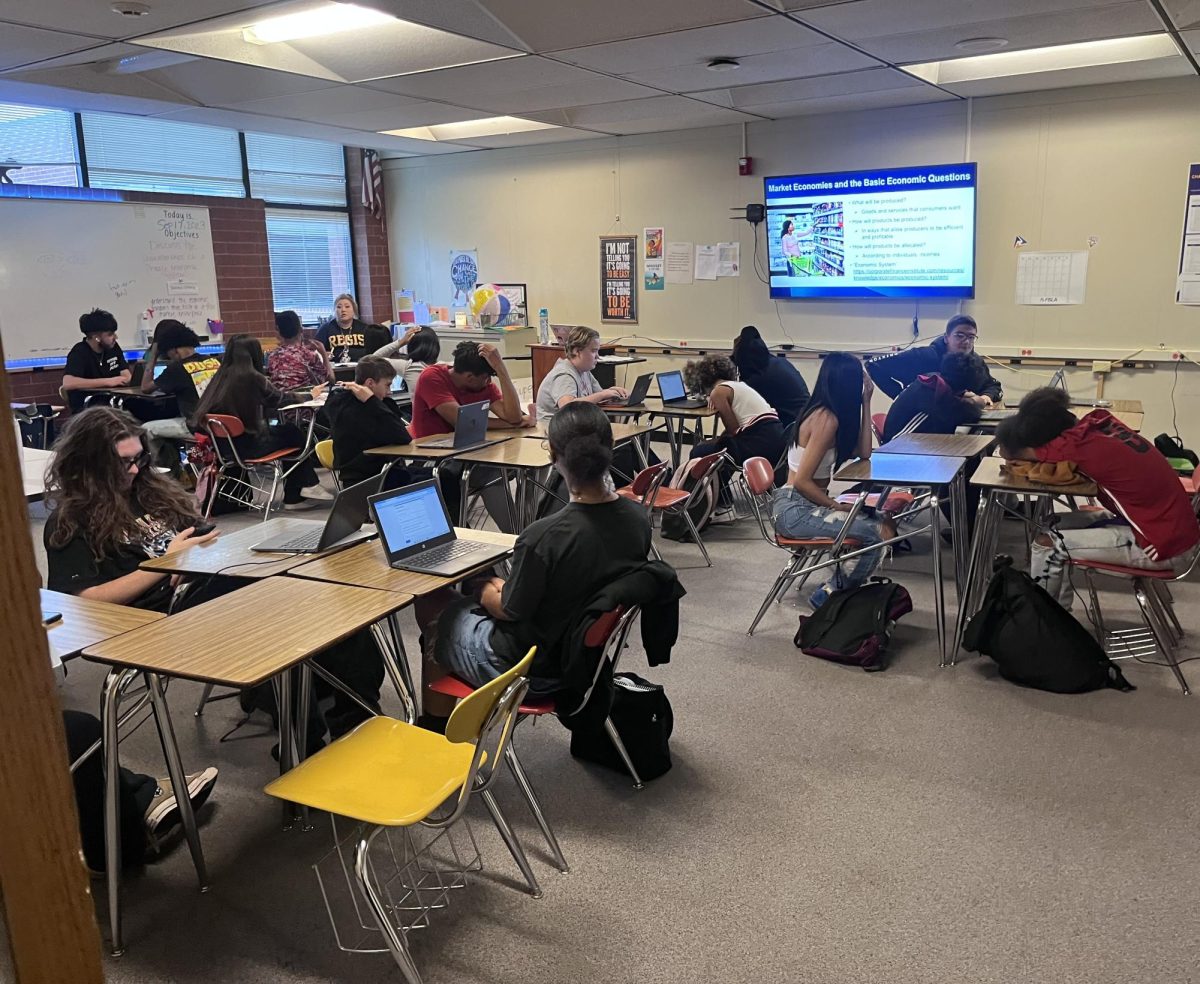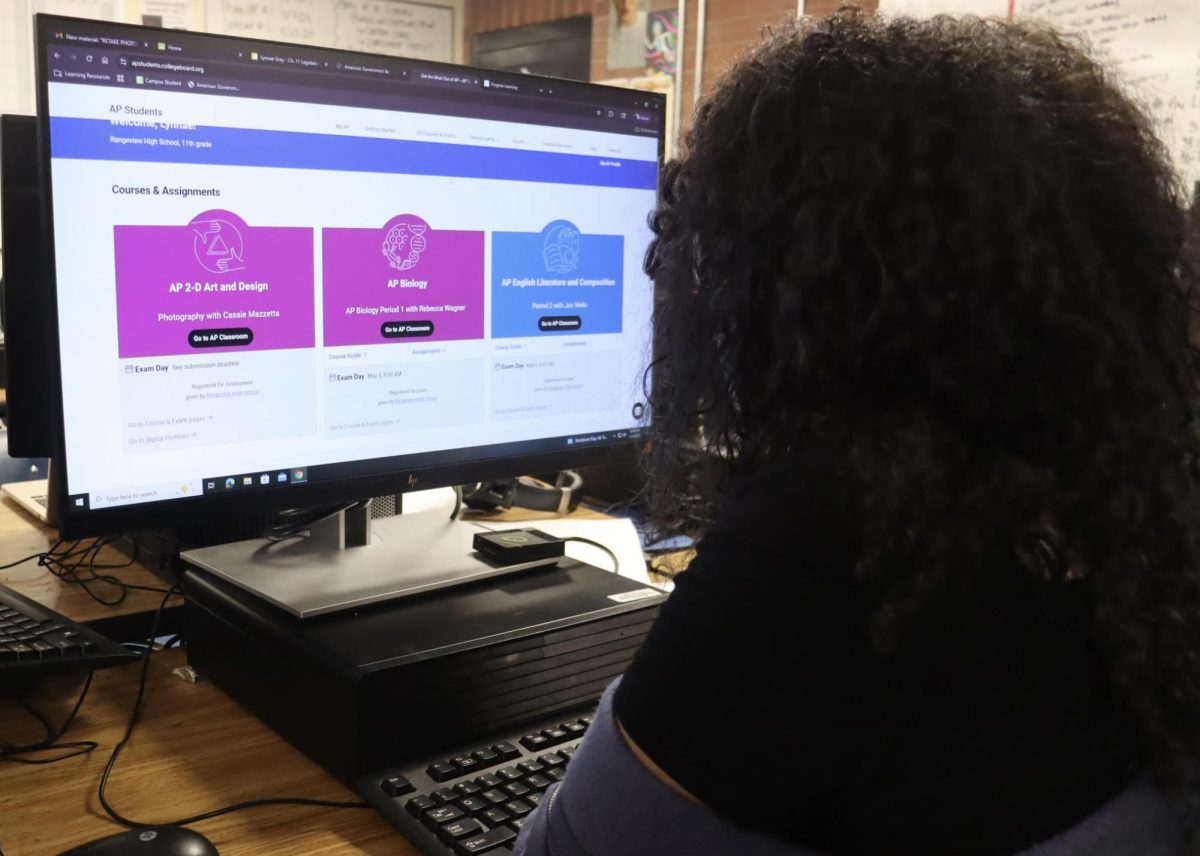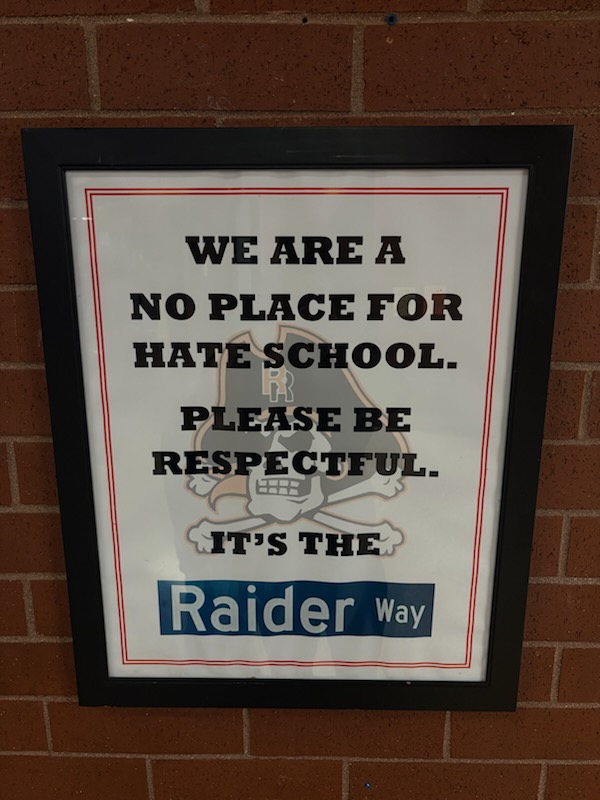Feature Photo By: Dominique Harlan – Social studies teacher Mrs. Westerdale debriefs her 1st hour honors history class on current events tying into International Women’s Day (IWD). IWD took place yesterday, March 8th. Westerdale stated that she wore red in fond support of IWD.
In 1987, Congress declared March as Women’s History Month. In light of spreading its awareness and true meaning, I decided to interview three female students who were all born in different countries, yet plan to make a powerful impact here in the United States with their influence. Considering the negative connotation tied to immigrants in America and the xenophobic approach that has been spread throughout, my goal was to prove that not only are immigrants worth more than words can describe, but that female immigrants who have been held back just as long as any other are worth just as much.
Coming to the United States is a very difficult process, and I wanted to first learn what was being provided to immigrant students resource wise– especially considering that the U.S. is not their place of birth, and English is not their first language.
“There’s different curriculums and different resources that we purchase as a school and as a district to help support them,” stated English ELA teacher, Ms. Thompson. “The district has a model of using what’s called CM and ELAG to help the kids learn English and to support them in content classes. I try to find resources that I think they’d be interested in based on different cultures and different struggles of overcoming different barriers and things kind of like their stories.”
Thompson later added that there are organizations that pair with schools where mental health resources are provided, along with services in different languages. According to Thompson, Rangeview is paired with the Immigrant Advocacy Organization (Rocky Mountain).
When it comes to learning English, Thompson noted, “We have a unit that we do. If you were taking something like Spanish I, it’s kind of like the same idea. You begin with that basic necessary vocab of understanding school things, things that are most prevalent to them in order to be able to communicate in their everyday lives. We work on that vocabulary first, and the structures of the English language. It’s like taking any foreign language course for one of the periods and then they also have a literacy course where they focus on reading and writing strategies.”
As far as talking to the three female students who are not natives to the U.S., they had very much to say about themselves — whether it be their personal lives and/or their lives back home. However, a key common factor that I noticed was how eager they were to learn a new culture and a new language while talking about the lives they lead. They put aside what the typical xenophobic American would label them as and looked beyond it, openly embracing everything they have to offer the world.
Meet junior Minjee Kim. Upon interviewing her, I noticed that she was very shy as she fiddled with her hands a lot while avoiding eye contact. It was nothing I couldn’t handle, and though getting her to open up wasn’t the easiest thing in the world, I was still aware that she had a story to tell as there was a lot hiding behind her shy persona. Kim was born in Jirisan, South Korea.
How is the United States different from South Korea?
“Mmm like, different learning, and different friend.”
What do you miss back home?
“I miss my friend and my dad. He is not here. I am with mother, and my sister live in California.”
What has been the most exciting for you here?
“Learning English and meet friend.”
Off camera and recording, I got Kim to open up a little more after asking her why she moved to the United States. Kim lit up when she stated that she wants to be a school counselor when she grows older. She later added that she moved because of her studies. Personally, I believe she can do anything she puts her mind to with a little effort and hard work.
The next person I talked to was freshman Valentina Inciarte. She seemed nervous at first, but after getting her to open up, she was more than happy to talk about her experiences thus far and the issues occurring back home in Venezuela. Inciarte moved to the United States nearly six months ago. She was born in Caracas, Venezuela.
What is going on back home? I recently researched that there are food shortages for a Spanish project. Would you like to talk about this?
“Yeah. We are having a hard time economically. Pretend you are teacher. You’re winning 32 dollars for a month. You gotta spend 300 dollars to buy food. It’s hard, see? There’s other problems, it’s really hard to get food because there aren’t enough dollars. People are dying because we don’t have enough food or enough money.”
(Inciarte wasn’t aware that she was also mentioning Venezuela’s inflation rate, which IMF (International Monetary Fund) predicts will top 1,600% this year, according to Forbes. Last year in May of 2016, a dozen of eggs costed $150 when the inflation rate was just above 700%.)
I ’ve heard that people have had to kill animals to get food, like flamingoes and anteaters. Have you seen this occur?
’ve heard that people have had to kill animals to get food, like flamingoes and anteaters. Have you seen this occur?
“Yeah, you also have to fight for the food if you get it. You have to wait like four hours at the super like a king sooper to get food if they have any, and sometimes when you get in there’s no more.”
How are things different here versus back home?
“Everything. It’s so different, like other words, other life. This is too many space, Venezuela is smaller. It’s more safety, it’s safe here. You can go walking by the street quietly. Because if you’re walking the streets in Venezuela you’re so afraid. People also help a lot.”
(Inciarte went on to talk about how dangerous things are back in Venezuela, which is why she came to the United States. She mentioned that people steal, and used my phone as an example of items they take. She also added that often times if you refuse, you are likely to be killed.)
Do you have anything else that you want to say?
“Mmm, work hard to get the things that you want. That’s not so easy for some people.”
Interestingly enough, while Inciarte was talking, she mentioned her step father who is Japanese. She has two brothers who are half Japanese, (Ouko, 9, Hiroki, 7) and is openly accepting of the diversity they bring along. Inciarte is not sure of what she wants to be yet, but simply speaking to her was enough for me to know that her positive and open-minded mindset will take her farther than she is aware of.
The last person I talked to was senior Erika Moran. Moran’s interview was extremely eye opening for me as she is a very strong individual. She found out that her mother was diagnosed with breast cancer and lymph nodes in August of 2016. I thought she would want to avoid talking about her mother, but that fact that she was open to it shows me that she is such a strong female who will be going very far in life. Moran is from Santa Ana, El Salvador. Her family came to the U.S. for better opportunities (her dad lived here first and received his citizenship.) She has three older sisters and a younger brother.
Would you like to talk about your mom?
“At the beginning of the year, we find out that she has cancer…The thing is that I was in school. So I couldn’t balance that out. She doesn’t speak English and she goes with a translator, but it’s not the same as having someone there. Her memory, like she knows, but sometimes she can’t say it, so that was the problem with her going to the doctors because they might say something to her that she wouldn’t even remember. It was so difficult for me coming to school because I’d miss like two days, then come back, and miss school again.”
How is this impacting your family?
“Well at the beginning it was really hard. I had to come to school and like for me my dad said that if we couldn’t be able to figure everything out he would quit his job. I was like no dad you’re like the support of everything. I was like if we don’t have another option then I will quit school, I can come next year. When I moved here they held me back, so I just said I could stay another year. So we started planning everything out and I talked with my counselor and my teachers and they were like ‘oh, we’re gonna help you,’ so I felt supported an d like everything was going to be fine.”
d like everything was going to be fine.”
(Moran added that her mother is getting better and her family is now more stable, her mother is receiving radiation to treat her cancer.)
Do you feel like you’ve grown since freshman year?
“Oh yeah. Personally, I have taken more responsibility, and I have grown more mentally. I have to think not just about me but others, and see how my actions affect others and how their acts are gonna have an affect on me.”
What do you miss the most back home?
“Family. I have my grandparents from both sides, and we were really close, because we lived in the same neighborhood… you’d only have to walk like fifteen steps together, it was really close. Then more like down was my mom’s side. I have my oldest sister over there too. I miss El Salvador too because it’s not as stressing as it is here. So it’s like really peaceful where I live. If you go to the city there’s crime, and it’s not as good as it could be.”
What has been the most exciting for you here?
“Meeting new people and learning a different culture from what I was used to. So many different cultures impact everything and everybody sees that as a bad thing. For me, it’s good to know people from different countries because we all are humans. I don’t like to see people discriminate others just because you’re from another country and you don’t English or something like that. I don’t like to see people not help. There’s people that immigrate and learn English, but when people from their same country move here they don’t like to help them. There’s so many people that do this. I like to help others improve.”
Is there anything else you want to add?
“That if you set your mind to something, you can achieve whatever you want to do in life. And it’s gonna be hard but you don’t even have to think about the future. I mean, you have to, but you don’t have to hold onto just that. I always say this, but everything that you do, you have to do it step by step. If you fall, you have to get up and start from wherever you stopped and never stop. You can do it, and if you cannot do it, ask for help.”
Moran later added that she isn’t quite set on a career yet, but she hopes to possibly become a preschool teacher, and is currently taking a class at Pickens for early childhood education. No matter what she sets herself up to be, I know regardless, she will succeed.
I love to see women empowering other women, and all three girls inspired me so much. Though they each come from different countries and different parts of the world, they all have the same idea of working hard and remaining accepting of new cultures. I learned more from them than a textbook could ever teach me, a TV show could ever show me, and a person with little experience could ever tell me. As stated previously, March is the month of Women’s History Month, and these three powerful women are storming through it just right.
For more information on how you can take a stand, visit https://www.womensmarch.com/ where one can plan to take action every 100 days.
If you are an immigrant in need of moral support, attend Legal Night at Mi Casa every third Tuesday of each month from 5:30 to 7pm.
Address: 360 Acoma (one block west of 4th and Broadway) Denver, CO 80204
Contact: (303) 573-1302
Or, attend Legal Night at El Centro de San Juan Diego every first Wednesday of each month from 5:30 to 7pm.
Address: 2830 Lawrence Street Denver, CO 80205
Contact: (303) 295-9470






